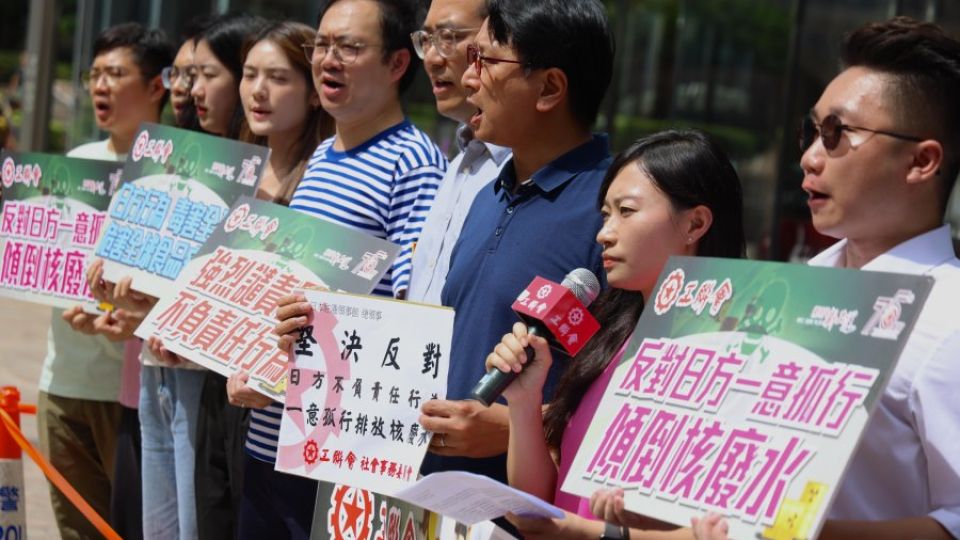August 23, 2023
HONG KONG – Chief Executive John Lee Ka-chiu announced a ban on importing Japanese food products on Tuesday in response to Japan’s decision to release wastewater from its stricken Fukushima nuclear plant into the Pacific Ocean from Thursday.
The ban will take effect from Thursday, government officials said at a briefing later in the afternoon.
The affected products include all fresh, frozen, refrigerated, dried or otherwise preserved seafood and sea salt, as well as raw or processed seaweed
Expressing strong opposition to Tokyo’s move on his social media post, Lee described the decision as “unprecedented and irresponsible”, as releasing a significant amount of nuclear wastewater over a period of one month amounts to disregarding the potential risks to food safety, as well as the irreversible damage to the marine environment without considering the consequences.
He said concerns about food safety and public health are the top priorities for the special administrative region government, and he has directed relevant authorities, such as the Environment and Ecology Bureau, to take immediate import control measures to safeguard the city’s food safety standards and protect the well-being of its residents.
Japan said on Tuesday it’ll start releasing more than one million tons of treated radioactive water from the damaged Fukushima nuclear power plant into the Pacific Ocean on Aug 24.
The SAR’s ban will cover marine products from 10 Japanese prefectures, including Tokyo, Fukushima, Chiba, Gunma, Tochigi, Ibaraki, Miyagi, Niigata, Nagano and Saitama. The affected products include all fresh, frozen, refrigerated, dried or otherwise preserved seafood and sea salt, as well as raw or processed seaweed.
The International Atomic Energy Agency has backed Japan’s decision, saying it’s consistent with the agency’s safety standards. The SAR government’s interdepartmental task force examined the IAEA report and concluded there’s no guarantee that the purification plant can operate continuously and effectively in the long term, nor can the disposal plan avoid posing any potential risk to food safety and marine ecology.
Speaking at a press briefing on Tuesday afternoon, Secretary for Environment and Ecology Tse Chin-wan said the ban will cover an indefinite period and will remain in force pending reports on the situation concerning the wastewater discharge and the findings of Japan’s monitoring mechanism.
In the face of the grave risks presented by the discharge plan, the SAR government must take protective measures accordingly to safeguard the public’s health and food safety in the city, Tse said.
A cross-department task force, comprising members of the bureau and other departments, will brief the public on Wednesday about the measures being taken to strengthen food security concerning food imported from Japan, and the Environment and Ecology Bureau will release, on a daily basis, results of radiation tests carried out on Japanese food samples and the radiation levels of local waters and marine creatures captured locally
A cross-department task force, comprising members of the bureau and other departments, will brief the public on Wednesday about the measures being taken to strengthen food security concerning food imported from Japan, and the Environment and Ecology Bureau will release, on a daily basis, results of radiation tests carried out on Japanese food samples and the radiation levels of local waters and marine creatures captured locally.
In the meantime, the city’s Centre for Food Safety has strengthened its testing of food imported from Japan. Since June, the authority has extended the scope of its tests on Japanese imported food to cover all marine products, and more tests are being conducted on processed food from Japan.
Tse also clarified that the time taken for clearance of Japanese food remains about three hours despite the government’s enhanced measures for testing and checking food from Japan.
Legislative Councilor Bill Tang Ka-piu urged the Japanese government to reconsider its decision to discharge wastewater, especially given the potential risks that doing so would pose to neighboring areas, including Hong Kong, as there will be no turning back once the wastewater is released.
Expressing strong dissatisfaction, Tang said the plan is selfish and there has been no precedent. There is no guarantee that the plan, lasting 30 years, will be successful, and data released by the Japanese government suggests that over 70 percent of the nuclear wastewater needs to be re-treated due to excessive radioactive pollutants, he told China Daily.
Tang said the food ban is definitely going to affect the city’s Japanese restaurants. However, they can still find alternatives to Japanese marine products, he said, as the safety of consumers must be the prioritized.
Another lawmaker, Joephy Chan Wing-yan, also expressed strong opposition to the plan. The city will bear the brunt of the nuclear wastewater discharge and Japan is a major source of food imports for Hong Kong, Chan told China Daily; thus many in the community are strongly against the release of the wastewater.
Chan urged the Japanese government to heed calls from all sides as there is no guarantee that the discharge of wastewater will not harm the marine environment.
Tang and Chan, together with a group of representatives from the city’s largest labor union — the Federation of Trade Unions — on Tuesday staged a protest outside the Consulate-General of Japan in Hong Kong. It was the fourth protest over the release of wastewater by the FTU, which blasted Japan for disregarding the concerns of the international community and the risks posed to human health and global ocean ecology.


